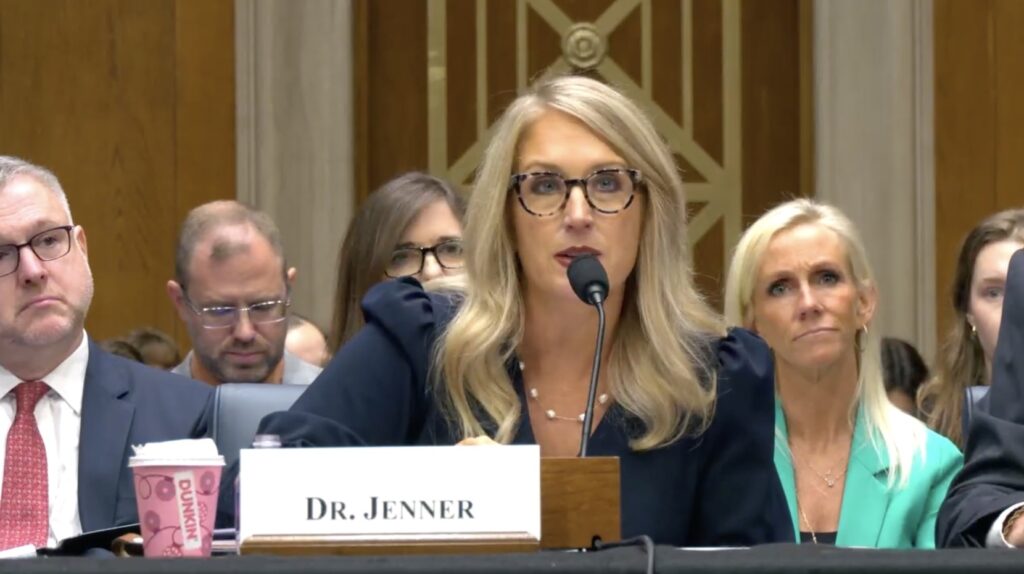Katie Jenner, Indiana’s secretary of Education and the state’s commissioner for higher education, testifies during a hearing in the U.S. Senate Committee on Health, Education, Labor and Pensions on Sept. 18, 2025. (Screenshot from committee livestream)
WASHINGTON — Just days after federal data revealed average reading, math and science scores dropped among certain grades since before the coronavirus pandemic, a U.S. Senate panel on Thursday picked apart the root causes and methods for students’ academic improvement.
The hearing in the Senate Committee on Health, Education, Labor and Pensions centered on the “state of K-12 education” — which GOP members on the committee described as “troubling” — in light of recent data from the National Assessment of Educational Progress, or NAEP.
NAEP, regarded as the gold standard for tracking students’ academic performance, showed that average science scores for eighth-graders decreased by 4 points since before the pandemic, in 2019. Average math and reading scores for 12th-graders also fell 3 points between 2019 and 2024.
The assessments were administered between January and March of 2024. Results also showed that just one-third of 12th-graders are considered academically prepared for college in math — a drop from 37% in 2019.
The committee’s chair, Sen. Bill Cassidy, said “it should concern us that children’s reading, math and science scores have yet to recover to pre-pandemic levels.”
The Louisiana Republican added that “success in education is not determined by how much we spend, but by who makes the decision and how wisely resources are directed,” and “when states and local communities are empowered to tailor solutions to meet the unique needs of students, innovation follows.”
On the other hand, Sen. Bernie Sanders, ranking member of the panel, said that “while we focus on education — as important as that is — we also have to focus on the conditions under which our children are living.”
The Vermont independent noted that “when you’re looking at the real world out there, we’re looking at millions of families that are struggling to put food on the table, to pay the rent, kids who are growing up in dysfunctional families.”
He said that while he’s glad the committee is focusing on these issues, “we have got to understand education is important — that means prioritize our children, prioritize our educators.”
Role of technology in education
Martin West, vice chair of the National Assessment Governing Board, which oversees and establishes policy for NAEP, said that while the assessments generally measure what’s happening to student achievement rather than the causes, “the patterns it documents can guide our search for explanations and solutions.”
He said the rise in smartphones and social media platforms that target youth is, in his view, one area to investigate.
“We lack direct evidence of a causal link between smartphones and learning, but I’m convinced that this technology is a key driver of youth mental health challenges, a distraction from learning, both inside and outside of schools, and a deterrent to reading when NAEP surveys reveal that many fewer students read on their own for fun,” he said.
Indiana’s approach
Katie Jenner, Indiana’s secretary of Education and the state’s commissioner for higher education, pointed to some of the initiatives in her state to improve students’ academic performance.
“Over the past three years, Indiana rebuilt early literacy based on the science of reading,” she said. “Backed by a major public-private partnership with Lilly Endowment, we have trained thousands of teachers, expanded coaching, and districts are adopting evidence-based materials.”
Jenner pointed to the Hoosier State seeing a historic jump in reading scores for third-graders this year, with a rise of nearly 5 percentage points from the previous year.
The state is also working on helping secondary students who continue to struggle with reading, including “deploying an outcomes-based contracting pilot, specifically for middle school reading in areas like tutoring and targeted interventions.”
Jenner said Indiana is also “rethinking high school” and “overhauled our diplomas, added outcomes-based incentives to our school funding formulas and ensured the connection to school accountability.”
‘State of education in shambles’
Meanwhile, some Democrats on the panel blasted President Donald Trump’s dramatic overhaul of the federal role in education as he seeks to dismantle the Education Department.
Though the assessments were conducted long before the start of Trump’s second White House administration, Democrats pointed to the changes the department has undergone since he took office again and their impact on students.
“I’m really glad that we are holding this hearing on the state of education because I am seeing the state of education in shambles under this Department of Education, where the president vowed to dismantle the Department of Education, he set immediately to work to tear apart programs that support our students and schools — no regard to the law or the consequences or even what’s best for our students,” said Sen. Patty Murray of Washington state.
“So, I see the state of education as delayed and frozen, canceling funding, robbing our schools of support for our teachers and our supports and services kids need to succeed,” she said.
Murray expressed concerns that “instead of working with us to fix the education system, Trump and the secretary of Education (Linda McMahon) are making it a lot worse.”


